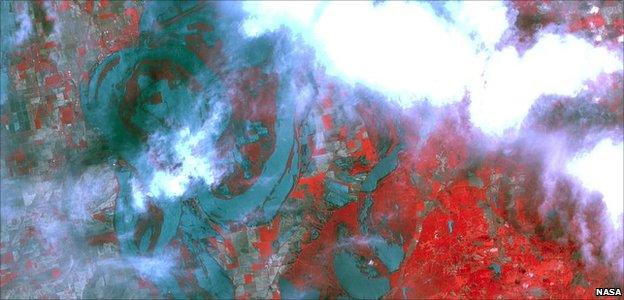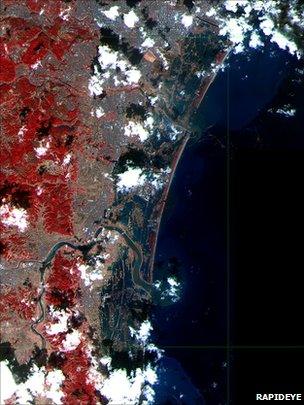UK leads space disaster charter
- Published

Floods: The latest requirement for charter satellite imagery has been in the mid-west of the US
The UK is to lead the international effort that co-ordinates the acquisition of satellite pictures whenever there is a natural disaster.
Britain will chair the International Charter on Space and Major Disasters, external for the next six months.
Images taken from orbit in the event of earthquakes or floods are critical tools in helping emergency responders deal with a crisis.
Satellite maps can show the extent of the damage or the areas under water.
NGOs, UN agencies and national civil protection centres will use the information to guide their aid efforts on the ground, pinpointing still-passable roads and the best locations to set up refugee camps or mobile medical units.
The charter was established by the French and European space agencies in 1999 but has since been joined by a range of other organisations, such as the UK Space Agency, that can provide access to remote-sensing satellites.
And the requests for help are becoming ever more frequent - at least once a month.
The charter has already been activated 12 times in 2011. These calls have included requests for satellite imagery of Japan after the 11 March earthquake and tsunami, external, and for data relating to the flooding in Queensland, Australia, in January.
The most recent activation occurred on 28 April to deal with the flooding in the central mid-west of the US.
When disaster strikes a region, the charter's operations team will check to see which of the members' satellites are due to pass over the affected area next.
The spacecraft with most appropriate sensors will then gather the imagery needed most urgently. This could be radar data showing the extent of an oil spill, or infrared pictures to show the extent of wildfires.

Satellites provided pictures of inundated Japanese coastlines after the 11 March tsunami
Normally, only a charter member can put the system into operation. Often, this means non-member countries having to seek a charter signatory to act on their behalf, wasting valuable hours before potentially life-saving satellite data is acquired.
During the UK's leadership, however, it has been agreed that any country can now draw upon the data provided by the system.
"If you are going to rely on a proxy to act on your behalf, it will add to the delay in activation; and we know there is great value in acting as swiftly as possible," Dr Alice Bunn, assistant director of Earth observation for the UK Space Agency (UKSA) and the new chair of the charter, told BBC News.
In Britain, the key player is the Disaster Monitoring Constellation (DMC) International Imaging company in Guildford, Surrey.
It manages five satellites, built by Surrey Satellite Technology Ltd, that are owned individually by Algeria, China, Nigeria, Turkey and the UK. Two further spacecraft, built for Nigeria, are about to launch.
Although the charter can call on data from some 30 satellites, these five countries in particular have together created a system specifically designed to respond to disasters. The DMC can acquire satellite images of anywhere on Earth at least once a day.
"It was a British company that designed the first satellite that had a specific use for observing disasters across the world; and then that has been joined by a several other satellites in a commercial arrangement," explained David Willetts, the minister for space in the UK government.
"So, we really are one of the world's leaders in satellite technology and it's great when as well as being put to commercial use, it's also being used for providing crucial information when there's a humanitarian disaster," he told BBC News.
The DMC satellites' worth was underlined in the aftermath of the 2004 Asian tsunami, when the constellation was able to map the entire coastline of the Indian Ocean basin in rapid time.
The charter has been activated over UK territory five times to date: twice during the 2007 floods, once during the Lyme Bay oil spill that same year and twice during volcanic eruptions on the British Overseas Territory of Montserrat in 2003 and 2008.
- Published7 March 2011
- Published28 September 2010
- Published26 June 2010